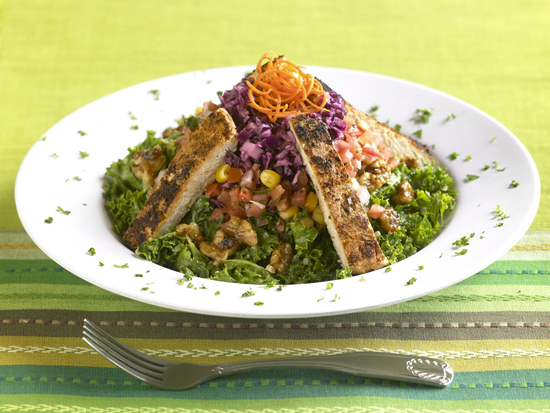Today, “Clueless” darling Alicia Silverstone calls it “The Kind Diet.” Now rewind back to 1944, when Donald Watson coined this term, “vegan.” In November of that year, Watson founded The Vegan Society and shook up the vegetarian revolution with a new lifestyle completely free of animal products.
A major distinction between vegetarianism and veganism is dairy consumption. For example, you can easily spot a vegetarian grabbing a slice of cheesy pizza from a dining hall, but vegans opt for something without dairy, eggs, honey, gelatin and other animal products. While politically swayed assumptions mark vegans as left-wing environmentalists, most vegans tout the health and spiritual benefits of their lifestyle.
“The standard American diet was formed out of family habits. That’s why heart disease is the No. 1 killer in the U.S., because our habits focus on burgers, red meat and chicken, all piled with cholesterol, “ said T.K. Pillan, co-founder of The Veggie Grill and UCLA Anderson graduate.
Pillan was a meat-eater himself back in his Anderson days and understands the habitual cravings of a carnivore.
“If you’re used to eating meat, you don’t want to mess around. You just want your chicken burrito, because it’s associated with comfort.” By substituting meat, poultry, dairy and eggs with plant-based foods, vegan restaurants like The Veggie Grill research innovative ways to pack on the flavor without any cholesterol or fat. Never before has veganism been so accessible for health-conscious eaters who aren’t completely ready to commit.
“We’re all about helping people make the transition ““ we don’t try to preach it. But the more clean food you have, the more your body craves it,” Pillan said.
Ashley Feuchs, a second-year world arts and culture student, has been a vegan since she was 16. Since then, her four-year journey as a vegan has been parallel to a conversation with her soul.
“I wanted my food to be pure, to be from the earth, and for me to regain control of my body and the karma that comes with the foods one eats. I don’t feel the need to consume other living beings,” Feuchs said.
Despite her family’s hesitation towards veganism, Feuchs recaptured a connection with food by cooking her own nutritious meals with plant protein. Although her dietary restrictions left her feeling guilty when invited to her friends’ homes, she learned to overcome these hindrances by finding strength in her central purpose.
“Just because much of the country eats meat does not mean it is healthy or connected to food. So really, carrying the revolution in my body is something I have to keep in mind. I eat the way I eat and live the way I live in order to, in a small way, make a change in the world,” Feuchs said.
Feuchs often feels limited by the vegan options at the dining halls and cafes.
“Raw plain tofu is not my idea of a delicious salad topping. … I would love to see a tofu scramble, vegan cookies and brownies,” Feuchs said.
As an avid cook, Feuchs has surprised many non-vegan friends with her home-cooked vegan meals.
“Cooking is so meditative for me, and I love to get creative with my recipes and show friends and family that vegan food can be just as ““ if not more ““ flavorful and creative as food containing meat or dairy,” Feuchs said.
Her only wish is for an on-campus kitchen where vegetarians and vegans could cook, perhaps in the Tom Bradley International Hall.
Second-year undeclared student Hannah Moser is currently the Cage-Free Eggs campaign coordinator for UCLA student-led organization Bruins for Animals.
Moser decided to become vegan in her senior year of high school with the help of informative materials from PETA as well as the Vegetarian Times magazine. Instead of relying on the difficult task of scanning ingredients, Moser’s family focused on cooking meals with fresh, plant-based ingredients.
After moving into on-campus housing, her plants-only path was blocked by countless hindrances.
“I get tempted when I see that delicious cheese pizza at Covel. I end up having to be vegetarian on some days,” Moser said.
Because there are drastically fewer choices for herbivores in the dining halls, living in the dorms can make diet sacrifices necessary.
“I’m about 80 percent vegan right now, but when I move into an apartment next year, I’m going to be 100 percent vegan. Even Ralphs carries vegan cheese these days, and Trader Joe’s is close by,” Moser said.
The limited vegan options on the Hill result from a combination of budget and time concerns because of the intensive research necessary for changes on the menu. However, improvements are swiftly moving forward with the aid of innovative recipes.Moser describes the importance of Bruins for Animals’ Veg Food campaign, which ensures availability, variety and proper labeling of vegetarian and vegan food on campus. Bruins for Animals’ participation in the campaign serves as a reference point for On-Campus Dining Services, from tasting new recipes before their debut and brainstorming future ideas.
“It’s difficult because vegan food is not always the main focus. It takes a lot of time to test things out with the chef, find the perfect ingredient, find the supplier and negotiate the price,” Moser said.
Some successful examples include the vegan “chicken” fingers at De Neve Late Night and more vegan options at Café 1919. Moser mentions her experiences working with Food and Beverage Director Daryl Ansel and Head Chef Roger Pigozzi.
“They really want to listen to us and make a change. There are more and more knowledge and improvements of vegan products at UCLA today than ever before,” Moser said.
